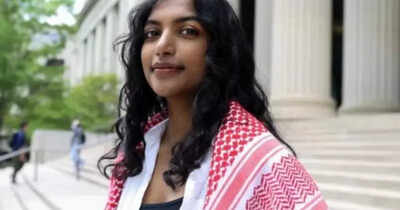Latest Education news – Board Exam Results, Admit Cards, Exam Paper Analysis and Question Papers | Times of India
Graduation ceremonies are traditionally moments of celebration, unity, and reflection—markers of perseverance and achievement in the academic journey. At a prestigious institution like the Massachusetts Institute of Technology (MIT), these events carry symbolic weight not just for the graduates but for the entire academic community. However, for Megha Vemuri, the elected president of MIT’s Class of 2025, this milestone became unexpectedly fraught with controversy. Her pre-commencement speech, which boldly addressed her institution’s involvement in international conflict, sparked a wave of debate and ultimately led to her being barred from attending the ceremony.This incident brings to the fore complex questions about the boundaries of student activism, freedom of expression, and institutional governance. At the heart of this discourse lies the content of Megha Vemuri’s speech—a series of powerful and provocative statements that challenged both MIT and its community to confront uncomfortable realities. Here are the five statements from the speech that led to her debarrment from the ceremony.
MIT’s research ties and responsibility
Vemuri did not hesitate to point fingers directly at MIT’s connections: “The Israeli occupation forces are the only foreign military that MIT has research ties with; this means that Israel’s assault on the Palestinian people is not only aided and abetted by our country, but our school.”
Condemnation of the situation in Gaza
Vemuri painted a grim picture of the humanitarian crisis: “We are watching Israel try to wipe Palestine off the face of the earth, and it is a shame that MIT is a part of it.”Her words invoked strong imagery, challenging the audience to consider the moral implications of their institution’s affiliations.
A call for moral action and leadership
Vemuri appealed to her fellow graduates’ sense of ethical responsibility: “As scientists, engineers, academics, and leaders, we have a commitment to support life, support aid efforts, and call for an arms embargo and keep demanding now as alumni that MIT cuts the ties.”
Recognition of campus activism
Highlighting recent student efforts, Vemuri acknowledged collective action: “Last spring, MIT’s undergraduate body and Graduate Student Union voted overwhelmingly to cut ties with the genocidal Israeli military. You called for a permanent ceasefire in Gaza, and you stood in solidarity with the pro-Palestine activists on campus.”
The reality in Gaza and the price of conflict
Vemuri concluded with a stark reminder of the ongoing devastation: “Right now, while we prepare to graduate and move forward with our lives, there are no universities left in Gaza.”This statement served to juxtapose the privilege of graduation with the harsh realities faced by Palestinians, framing her speech as a call to awareness and action.
Context and aftermath
The speech quickly went viral, drawing polarized reactions. MIT officials emphasized that the ban on Vemuri’s participation in the ceremony was due to her violation of the institution’s “time, place, and manner” rules for expression, rather than censorship of her views. Chancellor Melissa Nobles accused Vemuri of deliberately misleading commencement organizers and breaching agreed protocols.Vemuri acknowledged her speech was a “protest from the stage,” but called MIT’s response an “overreach.” The incident has sparked broader discussions on campus activism, freedom of speech, and institutional boundaries at leading universities during a period of heightened political sensitivity.
#Megha #Vemuri #statements #Indianorigin #MIT #students #exclusion #graduation #ceremony #MIT #Times #India
